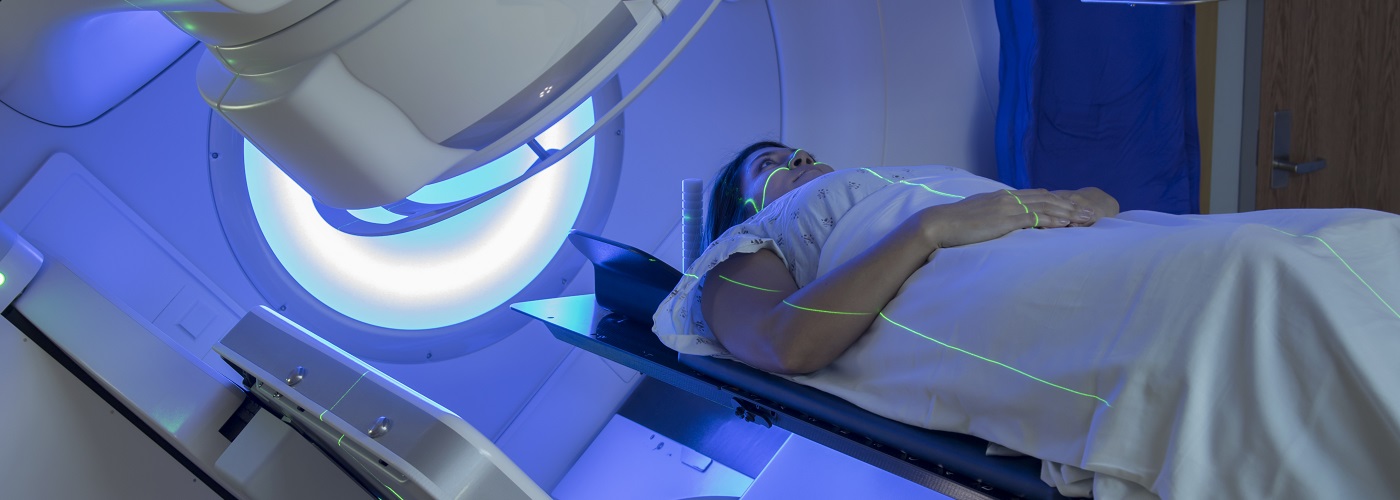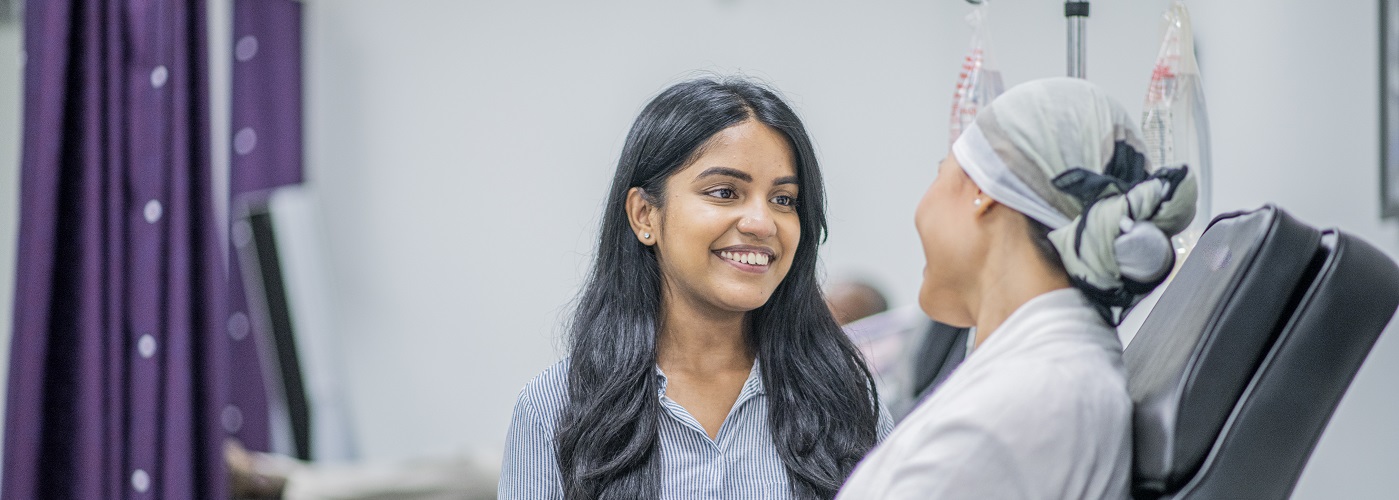Chemotherapy and radiotherapy are both used to treat cancer. Chemotherapy, often referred to as ‘chemo,’ kills cancer cells using special drugs while radiotherapy, or ‘radiation’ employs high-energy beams such as protons or X-rays to kill the abnormal cells.
Both chemotherapy and radiation are effective methods to kill cancer cells. When removing cancer cells and curing cancer is not possible, radiotherapy and chemotherapy can control, slow, and provide pain relief.
What is chemotherapy?
Chemotherapy drugs are systemic drugs that circulate your bloodstream. They kill cancer cells throughout your body, not just the primary site where the cancerous cells started.
You can receive chemotherapy via IV (a needle or port directs the drug directly into a blood vessel), orally (swallow a pill), or through injection (needle into the muscle).
What is radiotherapy?

Radiotherapy kills cancer cells with invisible bursts of energy rather than drugs. It is a 'local' treatment as the energy beams aim at the area where cancer cells grow. Radiation is quick (a few minutes at the most) and usually painless.
It is sometimes used preoperatively before removing a tumour or postoperatively to ensure no residual disease. Depending on cancer type and stage you are in, your doctor might use radiotherapy combined with surgery and/or chemotherapy.
External Radiation
Where a radiation machine shoots high energy beams to kill
cancer cells in a specific part of the body. It is akin to
receiving a chest X-ray. Examples of external radiation
treatments include 3D conformal radiation therapy and
intensity-modulated radiation therapy (IMRT).
Internal Radiation
Or ‘brachytherapy’ is when a radioactive source
(implant) is placed inside your body as close to the tumour as
possible. The implant works to deliver radiation directly to the
cancerous cells. Cancers commonly treated with internal
radiation include breast, lung, cervical, head, neck, and
prostate cancers.
Systemic Radiation
Where radioactive drugs are taken orally or intravenously. These
drugs then circulate around the body.
What are the side effects of chemotherapy and radiotherapy?
Both chemotherapy and radiotherapy can damage healthy cells in the process of getting rid of the cancer cells. However, there are some differences in side effects for these two treatment modalities.
Different chemo drugs cause different side effects. Additionally, everyone’s reaction to chemotherapy also varies. However, common side effects of chemotherapy include:
- Fatigue
- Hair loss
- Decreased blood count/anaemia (this can also contribute to fatigue)
- Nausea and vomiting
- General weakness
- Mouth and throat sores
- Diarrhoea
- Peripheral neuropathy (pain/numbness in limbs)
Because radiotherapy focuses on a particular area of the body, patients who have it as treatment may have fewer side effects than those undergoing chemotherapy. Nonetheless, radiotherapy does still affect normal cells. Common radiotherapy side effects include:
- Fatigue
- Skin changes (dry, inflamed, or blistering skin at the radiation site)
- Digestive issues (diarrhoea, nausea, vomiting)
- Swelling
- Stiffness
Learn more about the side effects of radiotherapy depending on the part of the body that was treated.
Which treatment is better: chemotherapy or radiotherapy?
This depends. Sometimes radiotherapy can be better for a particular type of cancer than chemotherapy, and vice versa. Factors such as the type of cancer, cancer stage, and patient’s general health all play a role in determining which type of treatment is more suitable.
As such, there is no better or worse. Rather, the aim is to have the most appropriate and effective treatment for the type of cancer and cancer stage you are in.
In fact, chemotherapy and radiotherapy sometimes complement each other and are used in combination (concurrent therapy). Concurrent therapy may be recommended if:
- Surgery is not an option
- There is a likelihood that cancer will spread to the other parts of your body
- You are not responding to the initial treatment
What is the best cancer treatment for me?
Your oncologist may recommend chemotherapy, radiotherapy, surgery, or a combination of these treatments. Your doctor will also explain the pros and cons of all treatment options and which treatment is most effective for the type of cancer you have.
It is crucial that you understand your options, so do ask more questions. If you are doing research on available treatments, be sure to use reliable sources. Your cancer care team will ensure that you have the best possible treatment for your condition.
What to expect with chemotherapy and radiotherapy?
Cancer is different for everyone. For some, remission is quick, while others battle it for years. There is no way to predict who will survive and for how long based on treatment type alone. Here are some things to expect if you have had a cancer diagnosis and starting radiotherapy or chemotherapy:
- Side effects: As mentioned above, both treatment modalities have side effects, although they do vary in intensity from person to person.
- Doctor’s appointments: Be ready to visit your doctor regularly. Your oncologist will need to assess your progress and check if your body is responding to treatment.
- Additional treatments: Radiation and chemotherapy are not the only treatments you might need. Your oncologist might also recommend surgery to remove tumours and medication to help you cope with chemotherapy or radiation side effects.
- Survival and recovery: Chemotherapy and radiation are treatments that may increase a cancer patient’s chance of going into remission. In fact, even when the cancer is considered terminal, these treatments can still slow the spread of cancer.
Book an appointment at Pantai Hospitals
A cancer diagnosis can be overwhelming and deciding on cancer treatments can be a challenge. The caring and multidisciplinary team of healthcare professionals at Pantai Hospitals is available for consultation to provide the best care and assistance to patients through cancer screening, diagnosis, and treatment.
The Radiology & Imaging Services Unit at Pantai Hospitals provides diagnostic and interventional procedures to patients by a multidisciplinary team of experienced radiologists, radiographers, staff nurses, and other support staff who specialise in imaging services.
Get in touch with us to book an appointment today if you have any concerns or questions about cancer treatment options or diagnostics imaging services.
Pantai Hospitals have been accredited by the Malaysian Society for Quality in Health (MSQH) for its commitment to patient safety and service quality.


 Request an Appointment
Request an Appointment.webp?sfvrsn=276ce14_1/vector-(3).webp) International Patient
International Patient

.webp)

 Find A Doctor
Find A Doctor



.webp?sfvrsn=20763f7d_19)
.webp?sfvrsn=f2a2c343_9)




